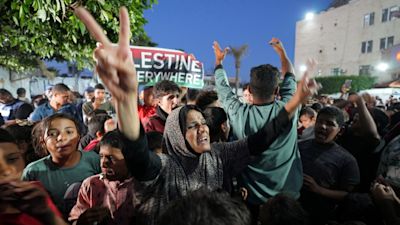Why there are still hopes for a ceasefire despite fears of new offensive in Gaza

ITV News Global Security Editor Rohit Kachroo explains why there are still hopes for a ceasefire despite fears of new offensive in Gaza
The news kept coming from Israel and Gaza.
Over the course of twelve hours yesterday, a series of developments appeared to push the entire region towards a state of heightened fear, then fresh hope, then back again.
The morning after, it is now clear that none of those dramatic events were as consequential as they appeared at first sight.
In Cairo, Doha, and Washington DC - the key capitals through which negotiations are being mediated and influenced - the biggest optimists revealed an enthusiasm from both sides to gain leverage and to wrong-foot their opponents.
But that, in turn, suggests they are still trying to shape conditions for a deal this week, according to three diplomatic sources with sight on the negotiations.
First came an evacuation order issued to 100,000 people in eastern Rafah on Monday morning, which appeared to signal the start of Israel’s long-promised ground assault in the southern Gazan city.
The attack could have devastating humanitarian consequences and threaten to end hopes for peace, according to the United Nations.
However, despite airstrikes overnight followed by reports that Israeli tanks were at the Rafah border crossing, the full-scale Rafah operation as forewarned had not yet begun at the time of writing this.
Monday afternoon’s wave of unexpected optimism came from the surprise announcement by Hamas that it had accepted a ceasefire deal.
There were small celebrations in the streets of The Strip. This looked like an eleventh-hour breakthrough ahead of a Rafah offensive.
But then came the important context: this was a set of proposals that Israeli officials hadn’t even seen and which they wouldn’t agree to.
It might feel like a moment for pessimism. After all, there are still significant gaps between both sides, including on the timing of the release of Israeli hostages and the path between a deal and an end to the conflict.
But among negotiators, the most positive assessment is that every big step taken yesterday was made with an eye on a diplomatic goal: Israel’s actions in Rafah were timed to put pressure on Hamas to agree to a deal before the end of the week - and Hamas’ surprise ceasefire announcement was made to signal that it had not given up on diplomacy.
Talks have resumed in Cairo today. Israel is sending a delegation so it can’t be blindsided by developments like it was yesterday afternoon.
And, the CIA chief William Burns is still in the region to apply pressure.
A foreign diplomatic source tells ITV News that these are conditions for progress: “We are fed up, but still hopeful”.
Want a quick and expert briefing on the biggest news stories? Listen to our latest podcasts to find out What You Need To Know…